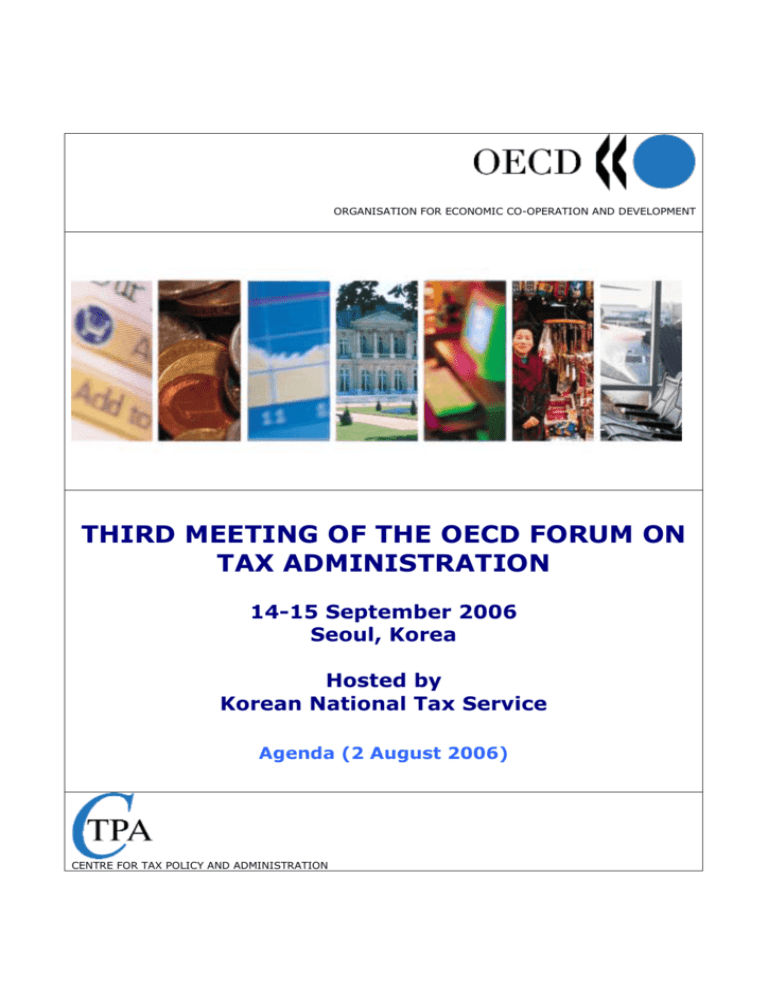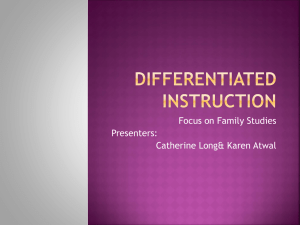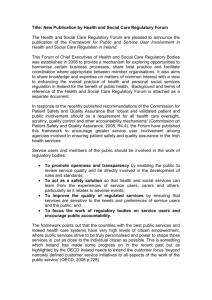Chair: Michael CARMODY (Australia)
advertisement

ORGANISATION FOR ECONOMIC CO-OPERATION AND DEVELOPMENT THIRD MEETING OF THE OECD FORUM ON TAX ADMINISTRATION 14-15 September 2006 Seoul, Korea Hosted by Korean National Tax Service Agenda (2 August 2006) CENTRE FOR TAX POLICY AND ADMINISTRATION THIRD MEETING OF THE FORUM ON TAX ADMINISTRATION Seoul, Korea—14-15 September 2006 Discussion Theme Topics 1) International enforcement The past decades have witnessed an unprecedented liberalisation and globalisation of national economies. Countries have increasingly removed or limited controls on foreign investment and relaxed or eliminated foreign exchange controls. At the same time progress in information and telecommunication technology has made the world a smaller place. As a result businesses and private taxpayers, particularly high-wealth taxpayers, increasingly operate in a borderless world. While businesses and private taxpayers increasingly go global, the activities of revenue bodies remain largely confined to their respective jurisdictions. The exercise of sovereign powers, including taxing powers, is generally limited to persons or events within a jurisdiction’s territory and any country might only see a small part of the overall activities or investments of a given taxpayer. However, revenue bodies are obligated to uphold and enforce their countries’ tax laws and in order to discharge their obligations they rely increasingly on improved and broadened cooperation with other countries. A background paper on this topic prepared by the OECD Secretariat was forwarded to delegates in early-August 2006. The Forum meeting will provide an opportunity for heads of delegations to discuss, in breakout session format, individual country responses to this challenge, and their impacts and experiences. The discussion in plenary will aim to summarize the key challenges and issues and ideas for making greater inroads to this non-compliance. 2) Organizational developments and reforms Within their respective public sectors, national revenue bodies strive to attain two important and complementary objectives: 1) to establish a well-functioning tax administration system—one that is efficient, effective, and provides high standards of service to taxpayers and other stakeholders; and 2) to provide government with much of the revenues it requires to fund community services. Revenue bodies face a range of external and internal forces or drivers for change that must be properly incorporated into their business planning activities. Changes in tax policy, mandates from government for improved revenue collection and/or to reductions in the regulatory burden on business and citizens, globalization impacts, advances in technology, and newly-emerging approaches for the delivery of government services represent some of the externally-driven forces for reform that revenue bodies must confront. From an internal perspective, a revenue body’s management will have its own ideas and change agenda for improving overall organizational performance. Integrating all of these forces for change into a coherent and achievable reform effort is one of the key challenges for heads of revenue bodies and their senior staff and, as experience shows, sometimes runs into difficulties. The format for the meeting provides for two country presentations on this topic followed by discussion in plenary format. The presentations will enable the revenue agencies concerned to showcase current key reform efforts that are intended to reshape the way revenue administrative functions are conducted in their respective countries and in the process contribute to significant improvements in the operation of the tax system. Presenters will reflect on the objectives of these reform efforts, the key issues and challenges being confronted, critical factors that are shaping the reform effort activities, and the progress being achieved. Wednesday, 13 September 2006 19:30-21:30 Welcome cocktail and dinner (Sapphire Ballroom) Thursday, 14 September 2006 09:00-09:45 09:45-10:30 I. Welcome Ceremony Mr. Moo-Hyun Roh (President of Korea) by video link Ms. Myeong Sook Han (Prime Minister of Korea) Mr. Goon-Pyo Jeon (Commissioner, Korea) Mr. Richard Hecklinger (Deputy Secretary General, OECD) Mr. Mark Everson (Chair, Forum on Tax Administration) II. Taking Forward the Work of the Forum Introductory comments by the FTA Chair, Mr. Mark Everson (United States) Open discussion 10:30-11:00 Break 11:00-11:45 III. Good Corporate Governance: The Tax Dimension Presentation: Mr. Dave Hartnett (United Kingdom) Open discussion 11.45-12:00 IV. TOPIC 1 – Introduction to Topic ‘International Enforcement: Key Challenges and Strategies FTA Chair, Mr. Mark Everson 12:00-13:30 Lunch 13:30-15:00 IV. TOPIC 1 - International Enforcement: Key Challenges and Strategies Breakout sessions led by discussion leaders: Group 1: Mr. Frank Daly (Ireland) Group 2: Mr. David Butler (New Zealand) Group 3: Mr. Pravin Gordhan (South Africa) 15:00-15:45 Break (and official Forum photo) 15:45-17:00 IV. TOPIC 1 - International Enforcement: Key Challenges and Strategies (continued) Breakout session reports Open discussion 17:00-17:30 V. Review of OECD Activities Presentation: Mr. Jeffrey Owens & Mr. Richard Highfield (OECD) 19:30-21:30 Official dinner with cultural events (Crystal Ballroom) Friday, 15 September 2006 09:00-9:30 VI. Major Recent Developments in Korean Tax Administration Presentation: Mr. Goon-Pyo Jeon (Korea) 9:30-11:15 VII. Organisational Developments and Reforms Presentation: Mr. Paul Gray (United Kingdom) Presentation: Ms. Jenny Thunnissen (Netherlands) Open discussion 11:15-11:40 Break 11:40-12:20 Conference Summation and Public Statement Mr. Mark Everson (FTA Chair) 12:20-12:45 12:45 VIII. Closing Remarks Mr. Jeffrey Owens (OECD) Mr. Goon-Pyo Jeon (Korea) Lunch Social Events - Excursions Friday, 15 14:30-21:00 Half day trip (Temple stay or DMZ) Friday, 15 - Saturday, 16 15:00-21:30 Overnight trip (Jeju Island) Forum on Tax Administration Seoul, Korea: 14-15 September 2006 Notes to Agenda 1) International Enforcement—Key Challenges and Strategies For this item the meeting will split into three breakout sessions each of around 30-35 people. There will be two English-speaking groups and one multilingual group. Allocation of participants to groups will be made closer to the meeting and advised in advance. Each breakout session will be of around 90 minutes duration. Discussion in each breakout session will be chaired by a nominated Commissioner: Group 1: Frank Daly (Ireland) Group 2: David Butler (New Zealand) Group 3: Pravin Gordhan (South Africa) (multilingual group) There will be a rapporteur appointed for each breakout session. To initiate discussion, each breakout session will commence with a brief (e.g. 5-10 minute) presentation by the chairing Commissioner focusing on: 1) the key international issues being addressed/to be confronted by their respective bodies; 2) the main strategies being deployed/planned; 3) main difficulties/challenges being experienced in confronting international non-compliance (e.g. expertise, resources, access to information, timeliness of detection, weaknesses in treaties); 4) ideas for major advances. After each presentation the discussion will be opened up among the group to get a broader sense, in a structured way, of individual country approaches and experiences and ideas for improving compliance. Country input to each of these areas will be captured by the rapporteur and an overall summary prepared for reporting back to the full meeting. 2) Organisational Developments and Reforms For this item there will be two substantive country presentations (i.e. Netherlands and United Kingdom) identifying the key developments and reforms that are shaping the way tax administration is/ will be conducted into the future in each country. The discussion in plenary provides the opportunity for delegates to further explore the issues raised in the presentations, to more generally discuss the reforms that are reshaping tax administration delivery, and possibly even identify areas of work that could be included in the Forum’s work program.






